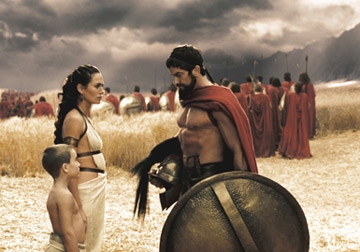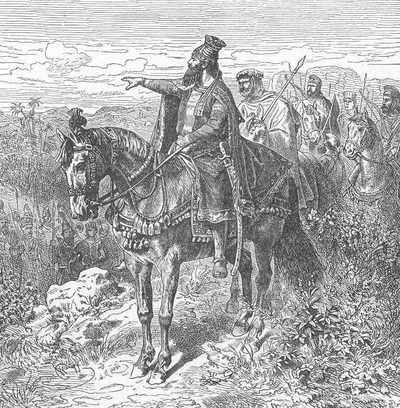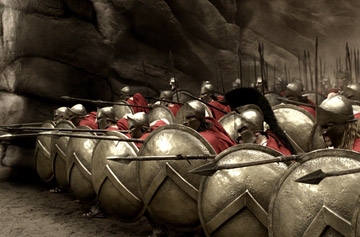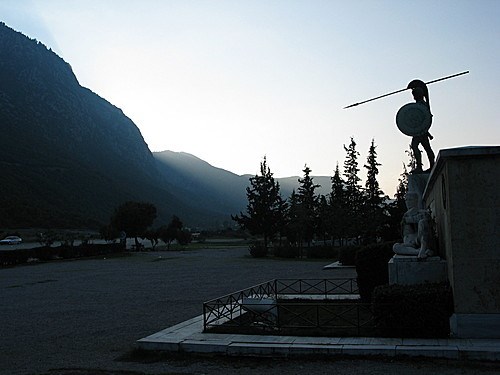 |
| Leonidas Says goodbye to his wife and son (http://movies.yahoo.com/movie/1809262865/photo/stills) |
We usually think of heroes saving lives, or being great orators but my kind of hero usually involves a battle of some kind or another. King Leonidas the 1st of Sparta is my favorite hero.
King Leonidas the 1st of Sparta is probably most remembered for leading the 300 Spartans to a doomed last stand at the battle of Thermopylae. We mostly only think of him and how he died. I am going to try to tell you about him and how he lived. He was born to Anaxandridas II of Sparta around 521 BC. His father was King of Sparta (an ancient Greek city state) and it was said that he was a descendant of Heracles or Hercules. He was the 2nd born in his family (not including an older half brother) and because of this his Dad didn't think he was going to be king so he sent Leonidas through the special Spartan training program that royalty was usually exempt from.
At the age of seven every Spartan boy was taken from their family to go through a special training program called the Agoge. This is what made the Spartans so good at war. At around twenty years of age they emerged from the Agoge and had as much or more training than our very best Navy Seals.
There is some speculation whether or not Leonidas was married to Gorgo, his half brother's (Cleomenes) daughter, or another woman who died perhaps while giving birth. It is mostly accepted that he was married to Gorgo but we do know that he did have a son named Pleistarchus.
We aren't really sure how he became King but he did. One assumption is that a little bit after Leonidas married Gorgo it became evident that Cleomenes was a wacko. Then he was put in the stocks by "them" (Gorgo, Leonidas, and Leonidas' brother Cleombrotus). Legend has it that he, in shame, mutilated himself until he died. Since Leonidas was married to Gorgo, (Cleomenes' daughter) that would make Leonidas his heir. Please do not even think for a second that he was a power hungry weasel. This goes completely against what history tells us about him. So look at it this way, you wouldn't want a real whack job as President, would you?
Sparta used to have 2 kings. One for diplomacy and one for war (the war king was the Agiad king and the diplomacy king was Eurypontid king). As you may guess Leonidas was the Agiad king. But for one year no one was in command of the Spartan army. One possible explanation is that since Leonidas and Cleombrotus were twins and that Cleombrotus was challenging Leonidas' right to be Agiad King. It really doesn't matter because about a year latter the Spartans were at war and most historians think that Leonidas was Agiad king. All that history tells us is that 2,000 Spartans left for Athens covering 140 miles on foot in 3 days but arrived too late for the battle of Marathon. After the battle (if he was Agiad king) Leonidas walked the battlefield interviewing troops gaining knowledge for what was to come 10 years later.
 |
| Xerxes the Great (The History of the World, by Ridpath, 1915) |
After the defeat at Marathon the Persian king Darius died and his son Xerxes took control of the Empire. In order to get revenge for his father's defeat he amassed an unbelievably huge campaign. Estimates of the Persian army range from 100,000 to 2,000,000. He then started off on his campaign to take Greece.
I should probably tell you that a former Eurypontid king named Demaratos had been exiled and took refuge in the Persian Court. He still had some sympathy for his countrymen so he sent a message to Sparta. He wrote the message on wood and put the wood in a wax tablet and sent it to Sparta. At first, no one in the entire city knew what to do with it until Gorgo told them to scrape away the wax (She was known for her intelligence). They found the message and warned all the other City States. Persia was about to consume Greece, but not if Leonidas and the Spartans had anything to do with it. Xerxes gave Greece an opportunity to surrender by sending an emissary to each major City State saying that a simple offering of "Earth and Water" would let them surrender unharmed. Spartans being Spartans threw their emissary into a well and told them to get all the earth and water they wanted.
 |
| The Spartan Phalanx (http://movies.yahoo.com/movie/1809262865/photo/stills) |
A few months later the Spartans set off on a march to the Thermopylae pass. Many people think that Leonidas and his bold 300 were the only Spartans there because there was a religious celebration (some think they were the only Greeks there) but the truth is that he was with about 7,000 Greeks and the majority of the Spartan army was at sea fighting in the huge naval battle against the Persian navy under Themistocles of Athens.
Here is how the battle went. The Greeks being on the defensive had an extremely better position because the pass at its smallest point was about 12 meters wide which decreased the amount of men that could fight at one time. If you were on the side with less people (the Greeks) it was a huge advantage because of their tight fighting formation called a phalanx, but if you were on the side with more people (the Persians) it was a huge disadvantage. Plus the Persians were known for their cavalry but in that narrow corridor the horses could not maneuver, thus they counted for nothing. The pass had a mountain on one side and the ocean on the other. Realizing this Xerxes sent some transport ships with troops to the rear of the Greek defensive but a storm destroyed all the ships. On the first day of fighting the Greeks inflicted massive amounts of casualties while losing very few men. Before the battle began a Persian told the Spartans "Our arrows will blot out the Sun". The Spartan responded, "then we will fight in the shade".
The second day went mostly the same, except for 2 things. One, the Persians asked the Greeks to lay down their weapons and Leonidas responded "come and take them". Two, the Persians sent in Xerxes' own body guards called the "immortals". These men were said to be the best fighting force in the world, better even than the Spartans. The Greeks put their name to the test. As it turns out, the "immortals" weren't immortals after all because the Greeks held them off just as well as they did with the regular infantry.
 |
| Monument of Leonidas at Thermopylae (http://static4.bareka.com/photos/medium/307643/statue-king-leonidas-thermopylae.jpg) |
On the third day, a Greek traitor named Ephialtes led a Persian general to the rear of the Greeks through an old goat path. But this path was not unknown by Leonidas. He sent some troops there but they ran away when they heard the Persians were coming. So Leonidas sent away all soldiers except for his 300 Spartans and a couple hundred Greeks who refused to leave. The Persians surrounded the Greeks and the Phalanx broke and then the battle was reduced to hand-to-hand fighting. There came a point in time when the Spartans were moving forward embracing death and the Greeks to the rear were moving back, running from it. Leonidas died relatively early in the battle but the Spartans recovered his body and took it back to their final position. The Spartans were then killed by a Persian volley of arrows. The historian Herodotus writes that Xerxes gave the order to cut off Leonidas' head to be put off a stake and for his body to be crucified.
The good news is that the Greeks inflicted so many casualties (conservative estimates are around 20,000) that the Persians' morale dropped to zero and the Greeks were so inspired by Leonidas' heroism that after a couple more victories and the final battle at Platea the Greeks expelled the Persians from Greece ending the war.
This is why I think Leonidas is a hero.
Page created on 5/18/2008 12:00:00 AM
Last edited 5/18/2008 12:00:00 AM
Schrader, Helena P.. "Leonidas." [Online] Available http://elysiumgates.com/~helena/leonidas.html.
Wikipedia. "Leonidas 1." [Online] Available http://en.wikipedia.org/wiki/Leonidas.
Scot, Andriean. "Who was Leonidas of Sparta." [Online] Available http://wiki.answers.com/Q/Who_was_Leonidas_of_Sparta.
Berrigan, Joseph. "Battle of Thermoplylae." [Online] Available http://joseph_berrigan.tripod.com/ancientbabylon/id28.html.
